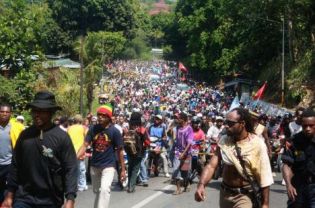Papuans Rally for Independence from Indonesia
January 26, 2011
 Thousands of Papuans march in a rally in Jayapura on July 8, 2010 to urge the provincial parliament to demand a referendum on self-determination, and reject the region's special autonomy within Indonesia. (AFP Photo/Banjir Ambarita)
Thousands of Papuans march in a rally in Jayapura on July 8, 2010 to urge the provincial parliament to demand a referendum on self-determination, and reject the region's special autonomy within Indonesia. (AFP Photo/Banjir Ambarita)Carrying a wooden coffin covered with a black cloth which said "Special Autonomy is Dead in Papua", more than 1,000 activists, students and church leaders protested in front of the provincial parliament in Jayapura, witnesses said.
"Independence for Papua, reject special autonomy," they shouted.
"Indonesia the coloniser, Indonesia the oppressor, Indonesia the robber."
They also called for the upper house of tribal leaders called the Papua People's Assembly (MRP) to be disbanded.
"The MRP had done nothing to improve the welfare of Papuans. Our people are poor in their own land," protest coordinator Selpius Bobi said.
"We reject special autonomy as that is the Indonesian government's policy which has never supported the natives. We want a referendum that will allow us to determine our own fate," he added.
Papua's special autonomy status, introduced in 2001 after the fall of former president Suharto's military dictatorship, has seen powers including control of most tax revenue from natural resources devolved to the provincial government.
However many Papuans say it has failed to improve their rights and activists accuse the Indonesian military of acting with brutal impunity against the indigenous Melanesian majority in the far-eastern region.
A court martial Monday jailed three Indonesian soldiers for up to 10 months for abuse and insubordination after graphic video footage showed them torturing civilians in Papua.
The sentences were criticized by the United States and rights campaigners as too lenient.
Foreign media and aid workers are not allowed into Papua and West Papua provinces to investigate allegations of human rights abuses against the indigenous people.
Papua has been the scene of a low-level insurgency for decades and despite Indonesia's vast security presence in the region, Jakarta remains extremely sensitive about any sign of separatism.
Indonesia has sent mixed messages about its willingness to loosen its grip on Papua, offering talks with separatist rebels on the one hand while jailing and killing their leaders on the other.